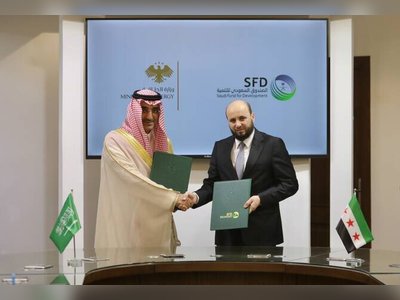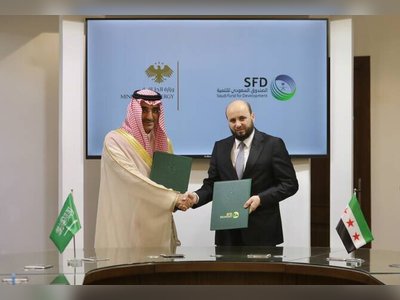
UAE Bets Big on Artificial Intelligence to Secure Future Beyond Oil
The UAE is rapidly building hyperscale data centers to become the Middle East's central node for artificial-intelligence infrastructure, shifting focus from oil to AI.
DUBAI: The United Arab Emirates (UAE), a nation once heavily reliant on oil production, has embarked on a significant transformation.
It is now investing billions in developing hyperscale data centers and positioning itself as the Middle East's central node for artificial-intelligence (AI) infrastructure.
This strategic shift aims to transform the country from one that fuels its economy with oil to one that propels it with bits and bytes.
The Gulf state’s commitment to AI is gaining global recognition.
In August, TRG Datacenters ranked the UAE among the world’s top three AI superpowers alongside the US and Saudi Arabia.
This recognition underscores the UAE's ambitious plan to trade traditional petroleum pipelines for digital ones, thereby fostering growth in the technology sector.
The hyperscale data center expansion, fueled by substantial sovereign wealth and global partnerships, has brought about both opportunities and challenges.
Critics argue that this infrastructure boom raises significant environmental and geopolitical concerns related to energy consumption, water usage, and data sovereignty.
The UAE's climate presents unique challenges; however, companies like Khazna Data Centers are addressing these issues through innovative sustainability measures.
Capital investments in AI technology have been substantial.
Microsoft's investment of $1.5 billion in Emirati technology firm G42, for instance, has facilitated the development and expansion of AI skills and infrastructure across the Middle East, Central Asia, and Africa.
This infusion of capital has empowered G42’s subsidiary Khazna Data Centers to spearhead hyperscale data center growth in the UAE.
The UAE's strategy includes not only physical infrastructure but also cloud computing initiatives.
Core42, another subsidiary of G42, is working on a $3.54 billion project with Microsoft and the Abu Dhabi government to create a sovereign cloud system that aims to modernize public sector services.
This initiative reflects the UAE’s commitment to achieving what it claims would be the world's first fully AI-native government by 2027.
The UAE's ambitious plans have attracted international attention and investments.
For instance, KKR, a US investment firm, entered into a $5 billion agreement with Emirati conglomerate Etisalat by e& in January this year to support data center expansion across the Gulf nations.
A notable project in the UAE is Stargate, a planned 10 sq.
mile AI campus expected to go live in 2026 and potentially become one of the largest AI data center networks outside the US.
G42 leads this initiative with backing from tech giants such as OpenAI, Nvidia, Oracle, Cisco, and SoftBank Group.
However, concerns have been raised about potential risks related to intellectual property security, given geopolitical tensions.
The UAE's approach to balancing sovereignty and sustainability in AI technology development remains a critical factor in its success.
While the country aims to reduce its dependence on foreign technologies, it must also navigate substantial power demands associated with AI workloads.
In conclusion, the UAE’s transition from an oil-centric economy to one driven by AI innovation is ambitious and multifaceted.
The challenges are significant, but so too are the potential rewards for a nation willing to invest in its digital future.
It is now investing billions in developing hyperscale data centers and positioning itself as the Middle East's central node for artificial-intelligence (AI) infrastructure.
This strategic shift aims to transform the country from one that fuels its economy with oil to one that propels it with bits and bytes.
The Gulf state’s commitment to AI is gaining global recognition.
In August, TRG Datacenters ranked the UAE among the world’s top three AI superpowers alongside the US and Saudi Arabia.
This recognition underscores the UAE's ambitious plan to trade traditional petroleum pipelines for digital ones, thereby fostering growth in the technology sector.
The hyperscale data center expansion, fueled by substantial sovereign wealth and global partnerships, has brought about both opportunities and challenges.
Critics argue that this infrastructure boom raises significant environmental and geopolitical concerns related to energy consumption, water usage, and data sovereignty.
The UAE's climate presents unique challenges; however, companies like Khazna Data Centers are addressing these issues through innovative sustainability measures.
Capital investments in AI technology have been substantial.
Microsoft's investment of $1.5 billion in Emirati technology firm G42, for instance, has facilitated the development and expansion of AI skills and infrastructure across the Middle East, Central Asia, and Africa.
This infusion of capital has empowered G42’s subsidiary Khazna Data Centers to spearhead hyperscale data center growth in the UAE.
The UAE's strategy includes not only physical infrastructure but also cloud computing initiatives.
Core42, another subsidiary of G42, is working on a $3.54 billion project with Microsoft and the Abu Dhabi government to create a sovereign cloud system that aims to modernize public sector services.
This initiative reflects the UAE’s commitment to achieving what it claims would be the world's first fully AI-native government by 2027.
The UAE's ambitious plans have attracted international attention and investments.
For instance, KKR, a US investment firm, entered into a $5 billion agreement with Emirati conglomerate Etisalat by e& in January this year to support data center expansion across the Gulf nations.
A notable project in the UAE is Stargate, a planned 10 sq.
mile AI campus expected to go live in 2026 and potentially become one of the largest AI data center networks outside the US.
G42 leads this initiative with backing from tech giants such as OpenAI, Nvidia, Oracle, Cisco, and SoftBank Group.
However, concerns have been raised about potential risks related to intellectual property security, given geopolitical tensions.
The UAE's approach to balancing sovereignty and sustainability in AI technology development remains a critical factor in its success.
While the country aims to reduce its dependence on foreign technologies, it must also navigate substantial power demands associated with AI workloads.
In conclusion, the UAE’s transition from an oil-centric economy to one driven by AI innovation is ambitious and multifaceted.
The challenges are significant, but so too are the potential rewards for a nation willing to invest in its digital future.











